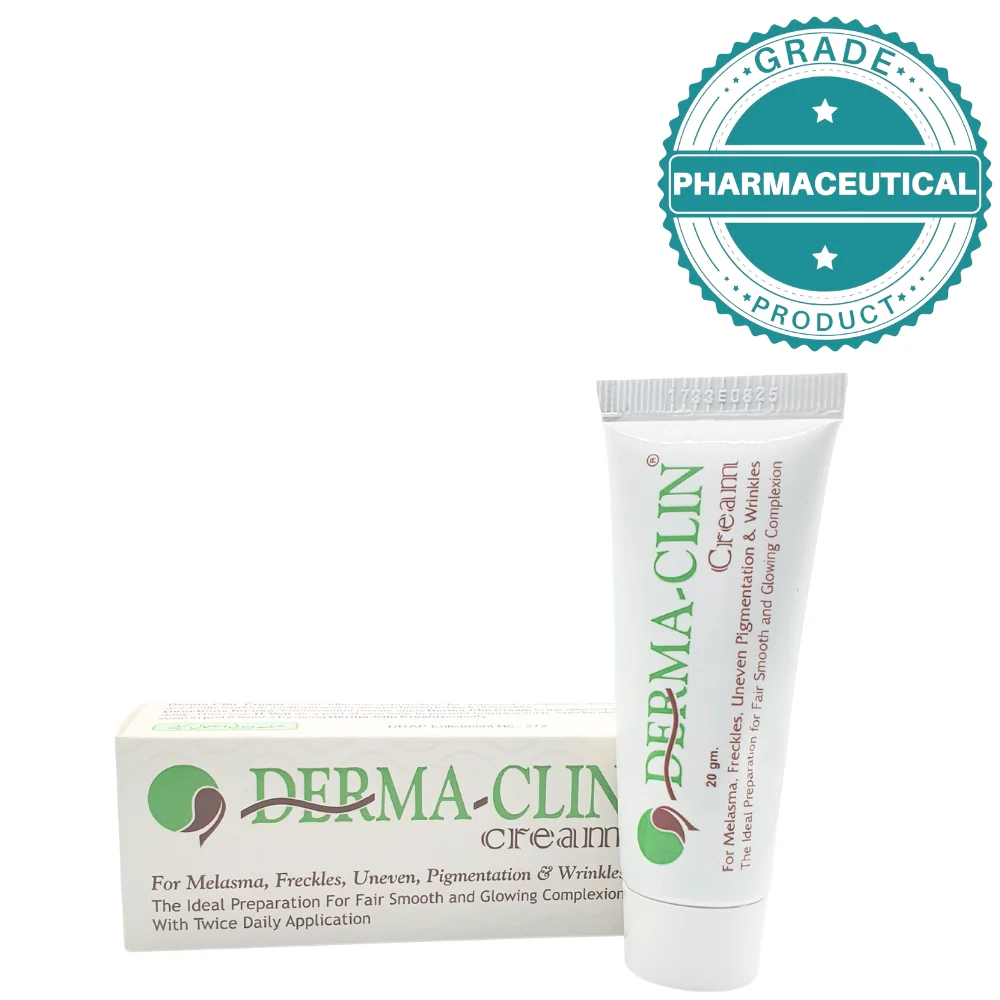Blog
Derma-Clin Cream: A Dermatologist’s Perspective on Skin Lightening and Fair Complexion

As a dermatologist, I often encounter patients seeking products like Derma-Clin Cream for achieving a fair complexion. While it may offer some benefits, it’s crucial to analyze its claims and limitations with a responsible and ethical approach.
Skin Lightening: Complexities and Cautions
- Understanding hyperpigmentation: Addressing uneven skin tone requires understanding the underlying cause, such as sun damage, melasma, or post-inflammatory hyperpigmentation. Treating the root cause is essential for lasting results.
- Limited evidence for topical creams: While Derma-Clin Cream mentions addressing concerns like melasma and freckles, the specific ingredients and their effectiveness for these conditions lack transparency. Topical lightening creams can have side effects, and their efficacy varies significantly based on individual factors and the cause of hyperpigmentation.
- Safety concerns: “Fairness” is a subjective term, and the pursuit of lighter skin can have ethical and social implications. It’s important to promote healthy skin practices and avoid perpetuating unrealistic beauty standards.

Reviewing Derma-Clin Cream:
- Ingredient analysis: The product description lacks information about key ingredients and their mechanisms of action. This makes it difficult to assess potential benefits and risks.
- Claims and guarantees: Guaranteeing “spectacular results” in 8 weeks raises concerns about unrealistic expectations and potentially misleading advertising. Individual results with skin lightening products can vary significantly.
- “For external use only” caution: While emphasizing this is crucial, it’s important to go beyond just stating it. Educating consumers about the potential dangers of misuse and encouraging consultation with a dermatologist for safe and effective options is essential.
Recommendations:
- Seek professional advice: A dermatologist can diagnose the cause of hyperpigmentation and develop a personalized treatment plan, which may include topical medications, procedures, or other safe and effective interventions.
- Manage expectations: Skin lightening often requires ongoing management, and individual results can vary significantly. Setting realistic expectations and focusing on overall skin health are crucial.
- Prioritize sun protection: Regardless of skin tone goals, daily sunscreen use with SPF 30 or higher is essential for preventing sun damage and hyperpigmentation.
[metaslider id=284 cssclass=””]
Conclusion:
While Derma-Clin Cream might contain some potentially beneficial ingredients, its claims for skin lightening lack transparency and raise ethical concerns. Consulting a dermatologist for personalized assessment and treatment options remains the gold standard for addressing hyperpigmentation. Remember, focusing on healthy skin practices and professional guidance is key to achieving and maintaining a radiant complexion, regardless of individual preferences for skin tone.
[metaslider id=1331 cssclass=””]
Categories
- Accessoreis
- Acne
- Aesthetic Procedures
- Anti Aging
- Author
- Baby Care
- Beauty
- Beauty & Cosmetics
- Blog
- Body Care
- cosmetic procedures
- Dandruff
- Dental Bonding
- Dental Care
- Dental Fillings
- Dental Health
- Dermatologist
- Dermatology
- Doctor
- Downloads
- Eye Care
- Food
- Food and Nutrition
- Hair Care
- Hair Loss Treatment
- Haircare
- Hand and foot care
- Health
- Health and Wellness
- Healthcare
- Imported Products
- Kids and baby care
- Laser Hair Removal
- Lip Care
- Medication
- Men's skin care
- Men's Skincare
- Nail Care
- Nutrition
- Oily Skin
- Online Consultation
- Oral Health
- Personal Care
- Pharmaceuticals
- Procedures
- Products and Ingredients
- scalp care
- Science
- Self care and wellness
- Shampoo
- Skin and Scalp Conditions
- Skin Care
- Skin Care and lifestyle
- Skin care myths and facts
- Skin Treatment
- Skincare
- skincare products
- Smile Design
- sunblocks
- Teeth Whitening
- wellness
- Whitening and brightening














